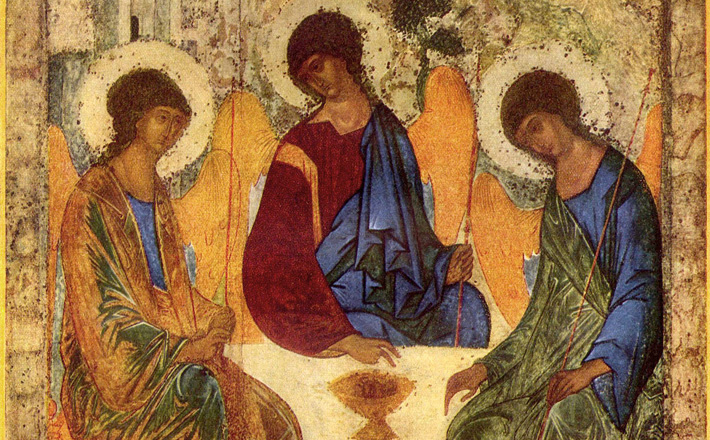Commentary on Romans 5:1-5
Romans 5:1-5 marks a major transition in Paul’s letter to the Romans from faith to hope.
The post baptismal life is expanded in Romans 5:1-8:39 That life can be described as the “overlap of the ages” (Byrne) between the inauguration of the blessings of Christ’s victory and their complete fulfillment when the faithful share the glory of God. In this in-between time, suffering continues to beset the community of faith, but hardship and pain are interpreted in light of righteousness and grasped in hope. The tension between the present and the “not yet” in these verses in expressed in the present fact of “we have obtained access” and future anticipation, “we boast in our hope of sharing the glory of God. Even suffering itself is a cause for boasting, explains Paul, presenting a neat chain of linked virtues: suffering to endurance, endurance to character, character to the penultimate gift of hope, that culminates in God’s love. The theme of “peace with God,” named in the opening verse, Romans 5:1, will be developed in the next passage, Romans 5:6-11, with the language of reconciliation of enemies.
The language of peace in the context of war
Paul uses a variety of terms for salvation that are at home in different semantic settings. Here the parallel images of “having peace with God” (Romans 5:1) and “being reconciled to God” (5:10, 11) have their meaning in the setting of warfare and conflict. The ancient audience of Romans would have recognized the echoes of imperial rhetoric that claimed the peace of the Pax Romana as the benefits gained by the emperor (Georgi 1991). Unlike the forced pacification of the Pax Romana through perpetuation of violence, here it is Jesus’ death (“through his blood” 5:9) that is the means of peace. For preachers reading Romans in a contemporary context where empire is a global phenomenon, using the language of enmity and reconciliation is both powerful and dangerous. Borrowing from the lexicon of imperial rhetoric, Romans uses the language of peace and war to present an alternative vision of peace made through Jesus’ death for the unrighteous. Reconciliation accomplished through Christ offers a critical and faithful perspective on the unending “war on terror.”
Boasting future and present
According to Paul’s anthropology boasting is a characteristic human activity. Boasting and being ashamed are part of the language of honor and shame typical of Greco-Roman culture. For a Christian, it is what one boasts about and on what basis that is a matter of debate and exhortation. While Paul criticizes boasting in Romans 2:17, 3:27, 4:2, here he celebrates boasting as positive. Here the speakers, “we,” who are made right with God through faith, as Abraham exemplified in Romans 4, may boast in hope and because we are saved from God’s wrath (5:3, 11). The phrase “glory of God” alludes to the story of Adam in Genesis (Genesis 1:26-28, Psalm 8:5-8) whose transgression caused him to lose the image or glory of God that he possessed. The early community of believers in Jesus believed that his death made possible a “new creation” in which that human beings are restored to the image of God and God’s glory. Boasting here is anticipatory — it does not brag about an achievement in the past, but is an expression of hope. Even present sufferings inspire boasting because of the virtues that are cultivated by suffering. Although modern interpreters may not share the same confidence in the disciplinary character of suffering, this text assumes it. This passage has the power to communicate hope as well as to describe it, and the preacher might attempt the same, naming those saints and communities of saints who indeed learn endurance (“patience” KJV) and character (“experience” KJV) through suffering (“tribulations” KJV).
Outpouring of God’s love through the spirit
“I will take you from the nations, and gather you from all the countries, and bring you into your own land. I will sprinkle clean water upon you, and you shall be clean from all your uncleanliness, and from all your idols I will cleanse you. A new heart I will give you, and a new spirit I will put within you; and I will remove from your body the heart of stone and give you a heart of flesh. I will put my spirit within you, and make you follow my statutes and be careful to observe my ordinances. Then you shall live in the land that I gave to your ancestors; and you shall be my people, and I will be your God” (Ezekiel 36:24-28),
As the prophetic tradition affirms, the Spirit is God’s gift of the new creation making the people of God ready for the new age. The physical image of “pouring” evokes the water of prophetic cleansing and of baptism. The love of God plentifully fills us and overflows (Romans 8:31-39). As did the community of the first century, the community of Christ in the present experiences God’s love as a present reality, given by the Spirit, even in the midst of violence and terror.


May 22, 2016